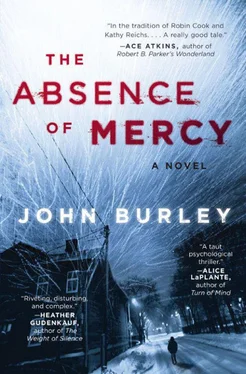The phone on his desk began to ring. It would be Detective Schroeder, notifying him that they’d obtained the search warrant. The final act of this investigation was about to commence, and Chief Samuel J. Garston of the Jefferson County Sheriff’s Department, having served steadfastly and dutifully on the force for the past thirty-eight years, two months, and fourteen days, realized he wanted nothing to do with it.
I do solemnly swear, he thought to himself, reaching for the phone, that I will faithfully and impartially execute the duties of my office… to the best of my skill, abilities, and judgment; so help me God.
It was Carl Schroeder on the line. The conversation was brief, a simple confirmation, and Sam hung up the phone within thirty seconds. He grabbed his coat off the rack and opened the door to his office. The chest discomfort he’d experienced earlier was subsiding, at least. There was that much. Hopefully, it had been nothing too serious. So help him God.
Detectives Schroeder and Hunt were the first to arrive at the Stevensons’ residence. There was one car in the driveway—Susan’s gray Saab—but after a protracted series of knocks on the front door it became clear that the house was empty. This wasn’t completely surprising, since it was the middle of the day and both of the physicians would presumably be at work. Officers were immediately dispatched to the hospital where Ben worked, and to the medical office Susan shared with a colleague. On the off chance that Ben was engaged in official duties at the Coroner’s Office, a car was sent to that address, as well. The building would need to be secured and thoroughly inspected regardless, since its numerous drawers, racks, and countertops could very conceivably host the weapons used in one or all of the murders. Chief Garston pulled into the driveway a few minutes after Schroeder and Hunt, and two additional cruisers arrived shortly thereafter, along with a van from the forensic investigation unit that had been dispatched to assist with the search of the premises and related evidence-gathering. The congregation of law enforcement vehicles and personnel quickly filled the Stevensons’ driveway and spilled out onto the narrow road servicing the suburban neighborhood.
Mary Jennings, who lived just across the street in a modest two-story split-foyer, noticed the accumulation of sheriff’s deputies and emergency vehicles from her kitchen window as she was preparing lunch. In a state of concern, she picked up the phone and dialed Susan Stevenson’s cell phone. As circumstances would have it, the voice that answered was neither across the street in the house now surrounded by police officers, nor at her medical office three miles away, but rather almost two thousand miles away, on the other side of the country.
“Hey, Mary. What’s up?”
Susan sounds particularly nonplussed, Mary thought, given the fact that half of the Jefferson County Sheriff’s Department is walking around on her front lawn . “I just wanted to make sure everything’s okay,” she replied. “There’re a bunch of cop cars sitting in your driveway. I thought maybe you guys might’ve had a break-in this morning.”
There was no response from the other end of the line, and Mary wondered if perhaps they’d been disconnected. “Sue?” she asked tentatively. “You still there?”
At first she thought that, indeed, she’d lost the connection. But as she listened she realized that the line was not completely dead. She could hear something in the background: the muffled voice of what sounded like a convenience store clerk ringing up a purchase (“ Will that be all? Can I get you anything else today? ”) beneath the subtle static of the open line. She began to take the receiver away from her ear when she heard—or at least thought she heard—a reply on the other end.
“—any?”
“Hello, Susan?”
“Mary, you there?”
“I’m here,” she replied. “Sorry. I thought we’d lost the—”
“How many?”
Her brow furrowed. She had no idea what her friend was referring to. “How many what ?” she asked.
“Cops. Sheriff’s deputies, Mary.” Susan’s tone sounded strained and impatient. “How many police officers are at the house?”
Still, the question bewildered her. It seemed to Mary that this was among the least important details of the situation. “I, uh… I don’t know. Let me check.” She went back to the window and peered through the glass. “I assume you’re not at home,” she said.
Susan left the question unanswered. Instead, her neighbor repeated her initial query. “How many, Mary?”
Mary counted the vehicles and the people whom she could see. Most, but not all of them, were in uniform. “Five—no, six—cars,” she reported. “One white van. Looks like about… I don’t know… twelve to fifteen officers. It’s hard to say. Some of them are still sitting in their cars. It looks like they’re waiting around for something. I thought… I mean, I know it’s a horrible thing to say and all,” she continued, “but… I thought maybe they were waiting for an ambulance.” Or a hearse, she thought, but omitted this last part. In the back of her mind, she’d been worried that perhaps Ben had suffered a heart attack or even a cardiac arrest. Susan’s husband had been looking like he’d been under a lot of stress lately. He’d seemed too gaunt, too… haunted was the word that popped into her brain. Her body gave an involuntary shudder.
“—en there?”
“I’m sorry, sweetheart. What was that?”
“Is Ben there?” Her voice sounded tense but controlled, almost—as ridiculous as the idea seemed—as if she’d been expecting this development all along.
”No,” she said. “I don’t see Ben’s car, and I don’t see him. Maybe they’re waiting for him to get home.” A thought struck her then, and she was unable to keep the alarm out of her voice. “Oh, God, Susan! I hope it’s not the children! I hope nothing’s happened to one of the kids!”
“The kids are with me,” Susan replied.
“ Oh, thank God! ” she said. “ Thank God for that, honey.”
The voice on the other end was quiet for a moment, then responded: “Yes. Thank God for that.”
For perhaps five seconds neither one of them spoke. It was a short pause, but within it, Mary was struck with the impression that a decision had been made.
“I have to go now, Mary,” Susan said. “Thank you for calling. I can’t tell you how important your phone call was, or how much I appreciate it.”
“Oh, you’re welcome, honey,” she replied, modestly brushing away the compliment yet pleased with herself for having been such a good friend and neighbor to the Stevensons, and to Susan in particular. Contacting her to make certain that she and her family were okay had just come naturally to Mary. It was the kind of thing neighbors used to do for each other all the time when she was growing up—and in the Midwest, she was proud to imagine, something neighbors still did for one another, no matter how disconnected and self-absorbed the rest of the country had become.
“You’ve always been a good friend to us, Mary. That friendship has meant a lot to me personally over the years. It still does. Regardless of everything else, I hope we can still have that.”
“Of course we can, Susan. You know you can come to me no matter what. If there’s anything I can do—anything at all—you just let me know.”
“Thank you, Mary. Good-bye.”
There was an audible click as the line was disconnected, and Mary returned the phone to its receptacle. She stood in the kitchen for a few moments, turning the conversation over in her mind. She realized that she’d learned very little about what was going on across the street at the Stevensons’ residence. Nevertheless, she decided that she had been able to offer them assistance, and for that she felt grateful. Humming quietly to herself, she went about setting the table for lunch.
Читать дальше
Конец ознакомительного отрывка
Купить книгу












